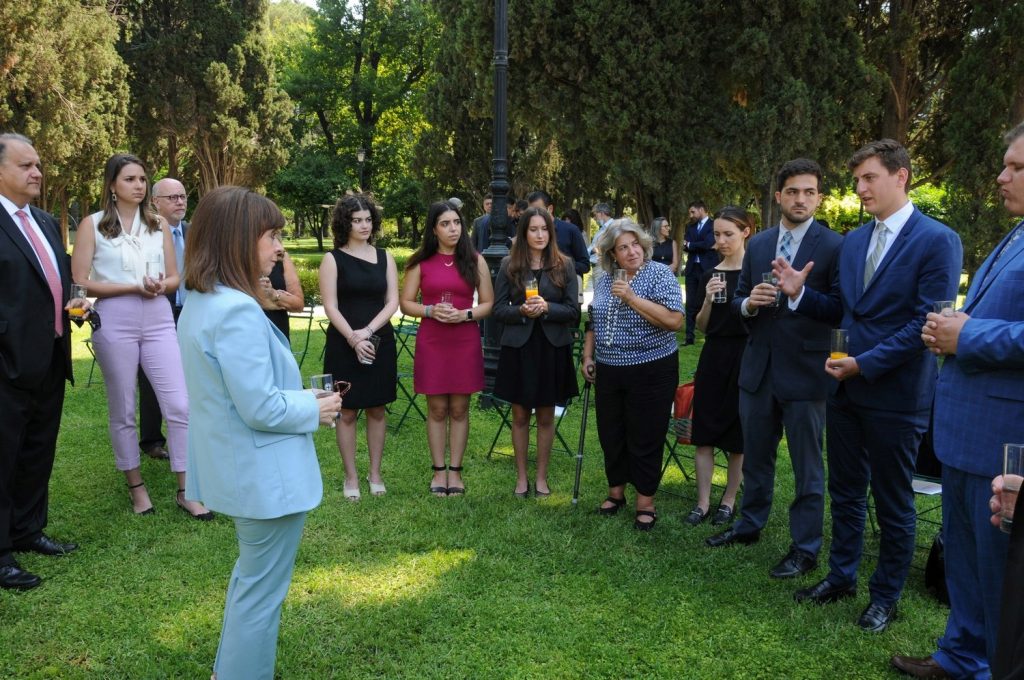Greek politicians often speak with almost dogmatic reverence about the Greek diaspora, especially when visiting communities across the Atlantic. They emphasize its importance, frequently calling it a national asset.
However, a deeper conversation with these officials often reveals glaring gaps: they lack both a vision and a strategic plan to harness this so-called “capital.”
It’s no secret that the position of Deputy Minister of Foreign Affairs for Hellenic Culture Abroad is typically given to a low-profile politician, often as a way to find a place for them in the government. While there are exceptions, they are few and far between—only serving to underscore the general rule.
This reflects a broader contradiction in how Greek government view expatriate Hellenism. On one hand, they acknowledge the diaspora, particularly in the United States, as a vital contributor to the homeland. Yet, on the other hand, they take it as something for granted that it is not a political priority.
This approach is a grave mistake, particularly when considering the changing demographics within the Greek-American community. A brief glance at current trends is telling.
Mass Greek immigration to the U.S. ended decades ago. The use of the Greek language is declining rapidly, with the community now largely consisting of fourth or fifth-generation Greek Americans. In many cases, it’s more accurate to describe them as Americans of Greek descent rather than expatriates.
Intermarriage with non-Greeks has become not just widespread but the norm—and may soon represent the majority. This shift means that even Greek surnames, which once marked national origin, are slowly disappearing. In many instances, mixed marriages lead to a departure from the Orthodox faith, often the last remaining bridge that connects many Greek-Americans to their heritage.
Even the once-mighty communities of the Greek Orthodox Archdiocese of America are shadows of their former selves. A visitor might not immediately notice the changes, but those who remember the past can see the stark difference compared to just a few decades ago.
Yet, this doesn’t mean we should mourn the demise of Hellenism in America. What it does mean is that we can no longer afford to take the Greek diaspora for granted—especially if we want it to thrive and continue to contribute to Greece for generations to come.
There are, thankfully, many encouraging signs. For those willing to see the glass as half full, there are numerous developments and efforts at revitalization emerging from within the diaspora itself.
For example, the Hellenic American Leadership Council (HALC) has succeeded in building a network of young activists focused on national issues, modeled after the American Jewish Committee (AJC). The Hellenic Initiative (THI) has attracted many young people through its impressive events, and the Archdiocese recently revived the long-dormant Youth Leadership Conference (YAL).
Sociology professor Nikolas Alexiou of Queens College sees both challenges and opportunities for the future of Greek expatriates. In an interview with To Vima, Alexiou explained that Greek-American identity is not static, suggesting that younger generations may be discovering new ways to connect with their Greek heritage, even as traditional markers like language fade.
“Greek American identity is not static but rather constantly being redefined through various cultural practices and experiences,” Alexiou explained.
Ultimately, the easiest way to cultivate a love for something is to understand it. No number of parades, lectures, or events at Greek schools can quite match the allure of a Greek summer. As Americans say, “Don’t tell me—show me.”
This sentiment is reflected in the growing number of programs designed to bring young Greek-Americans to Greece, where they can experience the beauty and importance of their roots firsthand.
The Greek diaspora remains a powerful force, but it is no longer guaranteed. For it to continue thriving—and to remain a meaningful asset to Greece—Athens must recognize that it requires more than just reverence. It requires action.

(Γ.Τ. Πρωθυπουργού/ Δημήτρης Παπαμήτσος)
How the National Hellenic Society is Reimagining Greek-American Heritage
Art Dimopoulos, the executive director of the National Hellenic Society (NHS), is on a mission to modernize how the Greek-American community connects with its roots.
Drawing comparisons to the technological disruptions of Amazon and the iPhone, Dimopoulos emphasizes that while the core of Greek heritage remains unchanged, its transmission must evolve to resonate with younger generations.
“We see this cross-cultural family as an opportunity, not a threat,” Dimopoulos told To Vima. “Our heritage has countless appealing aspects. It doesn’t need to change, but the way we pass it on does.”
Aiming to avoid reinventing the wheel, Dimopoulos has studied the successes of other communities, particularly the Birthright Israel program. With an initial investment of $100 million, the initiative has sent nearly half a million Jewish-American students to Israel. Though on a smaller scale, Dimopoulos believes that the NHS’s Heritage Greece program could have a similarly transformative effect on Greek-American students.
“The bottom line is that it makes a lasting impression,” Dimopoulos said. “We’ve seen students return to Greece with their families and find new meaning in their heritage. For many, it’s been life-changing.”
One standout story involves a student from California with a large family. Every year, around 60 family members would gather in Hawaii for a reunion. After participating in the program, the student visited his grandfather’s village where he reconnected with his relatives. Now, the family has abandoned Hawaii for their ancestral village, where their reunions are held annually.
But Heritage Greece extends far beyond summer trips to Greece. The National Hellenic Society is working to build a professional network, connecting Greek-American students with successful mentors from the community and helping them apply the values of their heritage to their careers.
“Our next step is to extend the program by two weeks and place selected students in internships with Greek companies,” Dimopoulos said. “We’re offering professional mentorship. Leaders like Dean Metropoulos and George Tenet can come in, inspire students about their heritage, and give career advice. Students will also attend local seminars hosted by various organizations.”
Dimopoulos emphasizes that the program is inclusive. Unlike many Greek-American organizations, Heritage Greece is not explicitly religious, reflecting the diversity within the community—many participants have only partial Greek heritage or come from different religious backgrounds.
Nonetheless, students are introduced to the Orthodox Christian faith, which remains a key element of Greece’s cultural identity. This exposure, Dimopoulos notes, is offered without pressure.
In some cases, students have voluntarily embraced Orthodoxy after participating in the program. He recalled one memorable moment when a group of students, on a visit to the island of Poros, decided to attend a small local church service.
“They went to this tiny, old church with a single room,” Dimopoulos said. “The boys even entered the altar and picked up religious objects (exapteriga) covered in cobwebs. The few people there began to cry. One Lutheran girl from California even chose to convert to Orthodoxy. And none of this was forced.”
American Hellenic Institute’s Foreign Policy Trip Aims to Educate and Empower Greek-American Students
When asked if the Greek-American community’s engagement with national issues is sometimes taken for granted, the president of the American Hellenic Institute (AHI), Nic Larigakis, is clear.
“You can take it for granted only one thing, and that is that they have no clue as to what goes on in East Mediterranean,” Larigakis maintains.

President of Greece Katerina Sakellaropoulou with the Greek-American students who participated in the “Foreign Policy Trip” program of the American Hellenic Institute.
To address this gap, AHI established the Foreign Policy Trip, an annual program that selects ten students from across the U.S. to travel to Greece and Cyprus. Students meet with political leaders, diplomats, and academics, gaining an in-depth understanding of the political complexities that shape foreign policy in the Eastern Mediterranean.
“As I like to say to our interlocutors, when we visit Greece and Cyprus, these 10 students are represented by 30 U.S. members of Congress because most of them come from different states,” says Nick Larigakis. “So, the most important component of all this is for them to come back, to be educated, and to be activists in the communities that they have a footprint in.”
Larigakis notes that several alumni of the program have shifted their career focus toward foreign policy. Some graduates have gone on to work in roles at the White House, Capitol Hill, and the State Department.
“This program transforms students. We’re essentially creating ambassadors for Greek-American issues within our community,” Larigakis emphasizes.
Zac Cotronakis is an embodiment of the community’s efforts to engage the younger generation. A graduate of the National Hellenic Society’s “Heritage Program,” he was inspired to pursue a career in promoting Greek-American affairs.
Following his graduation, he joined the Greek-American lobbying firm Manatos & Manatos, before being appointed executive director of American Hellenic Institute in 2023.
“The Heritage Program changed my life. It connected me to people who have remained some of my closest friends, including one who gave a speech at my wedding,” Cotronakis recalls. “That program inspired me to get involved and work for organizations that promote and enhance Hellenism across the United States.”



